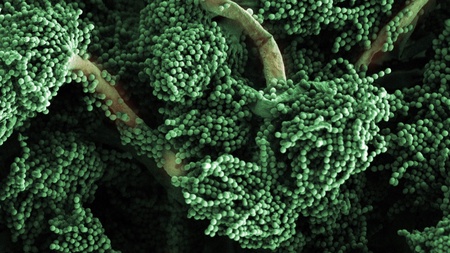Scientists at the University of Aberdeen have made a new discovery that could help in the fight against a fungus that kills around 200,000 people every year and causes lung and allergic diseases in millions of others.
The study, carried out in collaboration with a number of institutions**, sheds new light on our immune system’s response to a deadly microorganism and is published today in Nature.
Aspergillus fumigatus is one of the most feared complications for patients undergoing treatments such as transplantation as it can lead to an invasive infection that is fatal in over 50% of cases.
It is also thought to be responsible for a range of different lung diseases including asthma, in millions of people worldwide.
We breathe in hundreds of aspergillus spores every day as they are emitted from household items such as garden compost.
Aspergillus fumigatus is one of the most feared complications for patients undergoing treatments such as transplantation as it can lead to an invasive infection that is fatal in over 50% of cases.
It is also thought to be responsible for a range of different lung diseases including asthma, in millions of people worldwide.
We breathe in hundreds of aspergillus spores every day as they are emitted from household items such as garden compost.
For most healthy people, the spores do not lead to disease but for those with compromised immune systems it can be deadly.
The fungus is so effective because it is very difficult to diagnose and treat.
Scientists have been trying to understand how the human immune system recognises the fungus so they can develop therapies based on stimulating these body’s defences.
Now, in a new study, the team led by researchers at the Medical Research Council Centre(MRC) for Medical Mycology at the University of Aberdeen have identified a novel mechanism which responds to an ‘unexpected’ part of the fungus, triggering the immune system.
The receptor (MelLec) recognises a specific pigment in the fungi called melanin. This is unusual because it was previously thought that the immune system primarily recognised sugars in the cell wall of fungi.
This group have also found that variants of this receptor in people can make them more susceptible to infection, if they are undergoing medical procedures such as transplantation.
It is hoped that this finding could eventually inform the development of novel diagnostics and drugs to help combat these infections.
Professor Gordon Brown, Director of the MRC Centre for Medical Mycology at the University of Aberdeen says: “This is a fungus that most of us come into contact with on a daily basis without consequence. However, for vulnerable people undergoing serious medical interventions, it can be fatal.
“Understanding how our immune system responds to this invader is crucial to improving our ability to identify its presence in infected people and to develop therapies to help us treat this disease.
“This latest finding revealed that our immune system is responding to parts of the fungus we previously didn’t know it recognised. Whilst this discovery is a huge step forward it emphasises just how complex the fight against these fungi is.”
Anna Kinsey, Programme Manager for Viral and Fungal Infections at the MRC, said: “Fungal diseases can cause serious illness and death in patients with vulnerable immune systems and present a major challenge to healthcare providers. This new evidence of a novel pathway involved in the body’s recognition and response to particular types of fungal infection, generates new lines of enquiry for development of future therapies and tests to identify susceptibility to infection. It is an excellent example of the Centre’s capability to turn basic scientific discoveries into clinical advances.”


